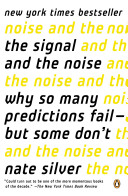The Early Days of the Printing Press was Like the Early WWW
As was the case during the early days of the World Wide Web, however, the quality of the information was highly varied. While the printing press paid almost immediate dividends in the production of higher quality maps,10 the bestseller list soon came to be dominated by heretical religious texts and pseudoscientific ones.11 Errors could now be mass-produced, like in the so-called Wicked Bible, which committed the most unfortunate typo in history to the page: thou shalt commit adultery.12 Meanwhile, exposure to so many new ideas was producing mass confusion. The amount of information was increasing much more rapidly than our understanding of what to do with it, or our ability to differentiate the useful information from the mistruths.13 Paradoxically, the result of having so much more shared knowledge was increasing isolation along national and religious lines. The instinctual shortcut that we take when we have “too much information” is to engage with it selectively, picking out the parts we like and ignoring the remainder, making allies with those who have made the same choices and enemies of the rest.
Notes:
The glut of books produced a situation of "too much information" similar to the one produced by the world wide web.
Folksonomies: information books mass media
Taxonomies:
/art and entertainment/books and literature (0.574139)
/technology and computing/internet technology (0.366639)
/society/senior living (0.195314)
Keywords:
world wide web (0.999588 (neutral:0.000000)), so-called Wicked Bible (0.860427 (negative:-0.616646)), heretical religious texts (0.851893 (negative:-0.656030)), WWW The glut (0.736841 (negative:-0.289906)), unfortunate typo (0.721915 (negative:-0.614708)), immediate dividends (0.718604 (negative:-0.656030)), bestseller list (0.705313 (negative:-0.656030)), instinctual shortcut (0.696925 (neutral:0.000000)), Printing Press (0.696136 (negative:-0.289906)), mass confusion (0.694373 (negative:-0.499565)), new ideas (0.683530 (negative:-0.499565)), higher quality (0.682421 (negative:-0.656030)), useful information (0.669866 (negative:-0.264325)), religious lines (0.667975 (negative:-0.221590)), Early (0.550034 (negative:-0.289906)), remainder (0.549075 (negative:-0.636194)), situation (0.544347 (negative:-0.289906)), allies (0.538200 (negative:-0.685294)), isolation (0.537264 (negative:-0.221590)), books (0.536920 (negative:-0.289906)), enemies (0.536332 (negative:-0.685294)), choices (0.536195 (negative:-0.685294)), Errors (0.536066 (negative:-0.656030)), exposure (0.535872 (negative:-0.499565)), result (0.534603 (negative:-0.221590)), rest (0.534318 (negative:-0.685294)), case (0.533989 (neutral:0.000000)), production (0.532796 (negative:-0.656030)), history (0.532171 (negative:-0.614708)), page (0.532124 (negative:-0.614708))
Entities:
world wide web:FieldTerminology (0.914585 (neutral:0.000000)), Printing Press:Company (0.878853 (negative:-0.472968))
Concepts:
World Wide Web (0.983945): dbpedia | freebase | yago
Printing press (0.675664): dbpedia | freebase
Printing (0.505383): dbpedia | freebase | opencyc
Book (0.461592): dbpedia | freebase | opencyc
Movable type (0.452392): dbpedia | freebase | yago
Tim Berners-Lee (0.451443): website | dbpedia | freebase | yago
Johannes Gutenberg (0.445923): dbpedia | freebase | yago
Web 2.0 (0.402739): dbpedia | freebase | yago






